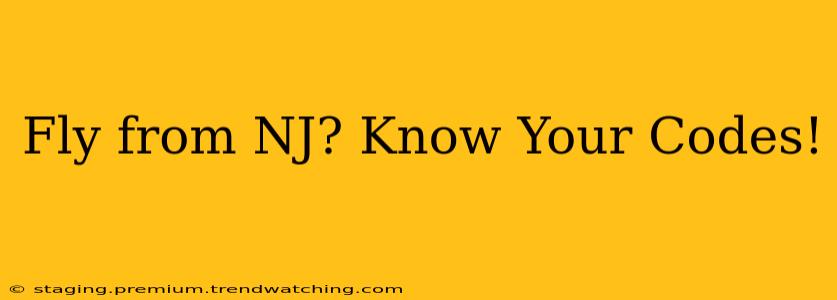New Jersey might not boast the mega-airports of some neighboring states, but it offers several convenient options for air travel, each with its own unique airport code. Understanding these codes is crucial for booking flights, tracking baggage, and ensuring a smooth travel experience. This guide will help you navigate the world of New Jersey airport codes and answer some frequently asked questions.
What are the main airports in New Jersey?
New Jersey's primary airports are Newark Liberty International Airport (EWR) and Teterboro Airport (TEB). While smaller airports exist, these two handle the bulk of commercial and private flights.
-
Newark Liberty International Airport (EWR): This is the largest and busiest airport in New Jersey, a major hub for United Airlines and a gateway to international and domestic destinations. Its IATA code (EWR) is universally recognized in flight bookings and scheduling systems.
-
Teterboro Airport (TEB): Primarily serving general aviation, Teterboro Airport caters to private jets and corporate flights. While not used for large-scale commercial flights, understanding its code (TEB) is essential for those using private aviation services.
What does IATA Airport Code mean?
The International Air Transport Association (IATA) assigns three-letter codes to airports worldwide. These codes are standardized across the industry, ensuring seamless communication and efficient booking processes. When you book a flight, the IATA airport code is a crucial identifier, specifying your departure and arrival points.
What are some other smaller airports in NJ?
While EWR and TEB are the main players, New Jersey does have smaller airports that serve specific purposes. These often cater to smaller aircraft and regional flights, and might not be as prominent in commercial travel. Knowing their existence is useful for specialized purposes, such as private flights or smaller charter operations. Information on these smaller airports can typically be found on aviation websites and flight tracking services.
What are the different types of airport codes?
Beyond IATA codes, you might encounter ICAO codes (International Civil Aviation Organization). These are four-letter codes used primarily for air traffic control and aviation management systems. While not as commonly used by the average traveler during booking, understanding the difference helps clarify the various identification systems within the aviation industry.
How do I find the right airport code for my flight?
When booking your flight, be sure to double-check the airport code displayed. Most flight booking websites and apps will clearly show the three-letter IATA code alongside the airport name. If you're unsure, you can always verify the code on the airport's official website. Using the correct code is critical to avoid booking the wrong flight or encountering delays.
Why is it important to know the airport code?
Knowing the airport codes for New Jersey airports is essential for several reasons:
- Accurate flight bookings: Using the correct code ensures you book the flight to your intended destination.
- Efficient baggage handling: The code is used to identify your baggage throughout the travel process.
- Smooth airport navigation: Understanding the code allows for efficient search and navigation within airport information systems.
- Clear communication: Using the code ensures clear communication with airlines and airport staff.
By understanding New Jersey's airport codes, you can navigate your travel plans confidently and smoothly. Remember, for commercial flights, EWR (Newark Liberty International Airport) is the primary code to know. For private aviation, TEB (Teterboro Airport) is the relevant code. Happy travels!

